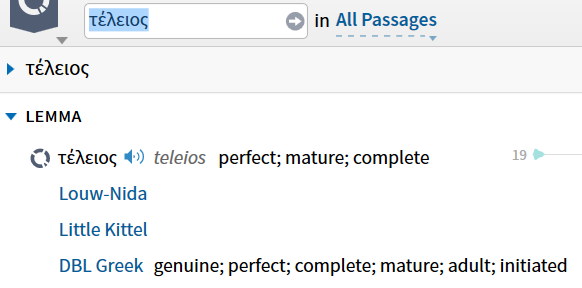I've had & been using regularly the Louw-Nida for about 5 years now. I've run in to places where one LN listing might say "Compare LN# xxxx for another interpretation." But the overlapping was clearly shown.
But when I was defining some of the key words for this week's SS lesson (1 Cor.13:8-13), I R-clicked on 1 Cor. 13:10 Perfect, (NKJV), clicked lemma to get to a BWS.


When it opened, I clicked on the "Louw-Nida" listing & it took me to # 88.36......
 .
.
So I went on thinking I had a accurate definition of the word in its 1 Cor 13:10 context. But later, I noticed for the same 13:10 Perfect, in the lower & inline reverse interlinears, it had listed LN# 68.23......
.
Again, I understand a clearly marked similar listing. But this is from pretty different domains.
LN 68 = Aspect - (Complete, Finish, Succeed)
LN 88 = Moral & Ethical Qualities (Perfect, Perfection)
I teach a multi- denominational class. I've always done my very best to teach as best I can only what is written. Context is always king, & my personal denominational leanings take a very distant back seat. The class has always been gracious & cooperated in kind.
One of those 2 definitions favors the personal view I have. But obviously I want accuracy on this specific word, not my personal bias.
So I'm not looking to slam anyone with my "Take", but I especially in the first half of class, want to focus those good people's attention completely & accurately on the text stated in the context it is written from. Then discuss how we feel God wants us to apply & walk it in our lives.
As most of you know, that word perfect is a sticking point in accurately interpreting/teaching/preaching 1 Cor 13:8-13. I'd like to go in to class with a solid definition of one or the other.
Can anyone out there point me as to which one rightly applies? Or do I just let the class know even the scholars aren't sure.